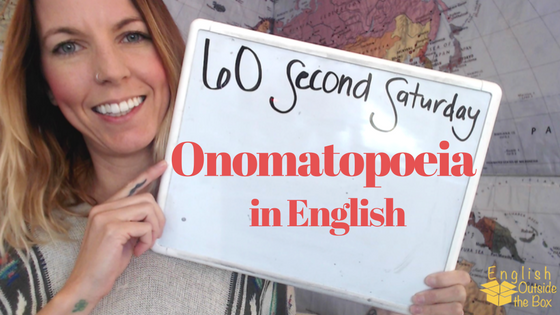
How to Laugh in English: English Onomatopoeia
Have you ever wondered how to laugh in English? Perhaps you’ve wondered how you can express admiration or awe, or show surprise (in English) when you’re writing. If you plan on doing any writing in English, you need to be familiar with onomatopoeia.
It’s important to note that English onomatopoeia is different than Portuguese onomatopoeia, or Spanish, French, etc.. You must remember that when you are communicating in English, and writing in English, your written “sounds” need to be consistent with the language as well.
In this 60 Second Saturday lesson, we’ll be reviewing onomatopoeia related to laughter and some interjections. The full lesson below will also provide some additional ways to practice onomatopoeia as well as an additional resource to learn.
Let’s go!
English Onomatopoeia
What is onomatopoeia?
Onomatopoeia is the written sounds that we [or things] naturally produce.
Think about the sound of a water drop hitting the ground, “drip”. Imagine the sound of a large, heavy textbook falling off the table and hitting the ground, “bam” or “thud”. What’s the sound of your hands coming together quickly? “clap” These are all examples of onomatopoeia.
We start learning these sounds (and how they look in written text) as children in story books or as some of our first words.
What do dogs say? “woof woof” – – What do little, pink piggies say? “oink oink” – – What do kitty-cats say? “meow meow”
It may seem strange to learn English onomatopoeia because you associate these sounds in your own language; however, if you are expressing yourself in English, you need to be consistent with how onomatopoeia as well, including when you laugh and voice interjections.
Laughing in English
The most common way to write laughter in English is “haha”. If we want to express more of a giggle, then we can write “hehe” as well. These are examples of onomatopoeia and are different than the acronyms LOL (laughing/laugh out loud) or ROFL (rolling on the floor laughing).
Common mistakes that I’ve seen and read are when students write sentences in English, or are communicating in English, and then write their language’s laughter in the same conversation.
So if you’re communicating in English and want to express laughter, write “haha” or “hehe”. Avoid “kkkkk” or “rsrsrs” (Portuguese) or “jajaja” (Spanish) and other variations of laughter in different languages.
I’ve had students argue that they are “laughing in their language”, and want to express this laughter in their language. I understand that way of thinking; however, I disagree and say that the language of communication needs to be consistent. If you’re communicating with an English speaker and write “kkkkk” or “jajaja”, you’ll most likely cause miscommunication as it’s not English.
Interjections in English
When you want to express admiration or awe, we write that sound like “aw” or “awwwwww”. We often write this (and express) this sound when we see something cute or something we like, or if we want to express sympathy to another. It can also be used to show disappointment.
A mistake that I’ve seen is this written as “owwwnn”. So avoid this when communicating in English!
Some other common examples of interjections in English onomatopoeia:
wow / woah – to show surprise, shock
ah (ahhh) – to show realization, relief
ouch – to show pain
ugh – to show annoyance
oh (ohhhh) – to show understanding
Practice Makes Perfect
Can you write some sentences utilizing the onomatopoeia we’ve reviewed today? Write them in the comments below!
Additionally, you can review more about English onomatopoeia in this lesson, “Onomatowhatta? Understanding Onomatopoeia in English”
Until next time,
Happy Studying! ♥
Do you know a friend learning English? Help me help them and share this lesson with them!

I loved this. (woof woof!) Thank you!!
Bang clank
<3
Can I use “Wahaha” to state a loud laughter in English?
sure!